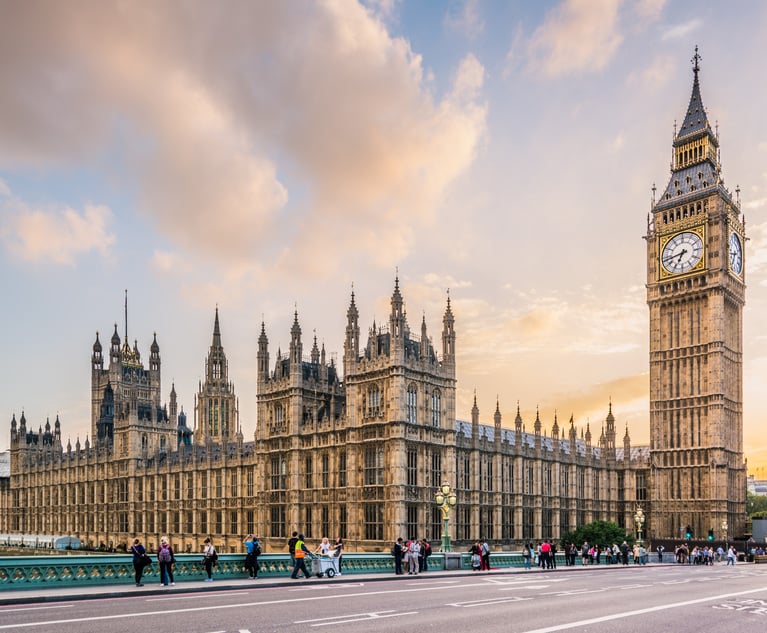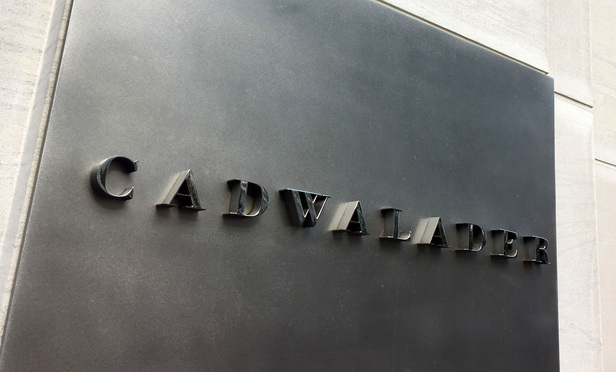Cadwalader revenue shrinks 2.5% following office closures and partner exits
Partner profits inch up as firm targets tighter core focus
February 13, 2017 at 05:45 AM
5 minute read
The original version of this story was published on Law.com
Cadwalader Wickersham & Taft saw its revenue decline in 2016, amid partner defections and office closures. But managing partner Patrick Quinn pointed to higher profits as a sign that the firm's tighter focus on core clients and practices is paying off.
Profits per partner, after dropping consecutively for three years, rose 2.7% in 2016 to $2.115m (£1.69m). Gross revenue fell by 2.5% to $452m (£360.9m) last year, according to preliminary American Lawyer reporting.
Even with declining income, revenue per lawyer at Cadwalader, with its smaller size, held steady at about $1.03m (£820,000). Headcount declined 2.2% to 438 lawyers, while the number of equity partners dropped by two to 45.
Revenue dropped in 2016 because "we're a smaller firm than where we were before", Quinn said.
The rise in profits per partner, he said, stemmed from the firm focusing its energies on its largest client base and Wall Street heritage, including financial institutions, large corporations and public companies and, increasingly, hedge funds and private equity firms.
"We emphasise practices where the firm is best situated to succeed by meeting the needs of our clients, rather than trying to create demand in other areas," Quinn said.
Quinn said the firm had sought years ago to diversify too broadly, entering areas that were "not the practices that best served our natural client base".
During the past year, he said, partners have conducted a "top-down look at the firm as to which practices are consistent with that focused strategy, and putting our resources behind those and making some, frankly, difficult decisions about some of the other offices".
Cadwalader confirmed in September it was closing its Asia offices in Hong Kong and Beijing, and in January said it was closing its Houston branch. The energy practice "had a tough year", Quinn said.
But he added that closing in Houston and other markets had more to do with targeting the firm's core client base than with short-term performance.
In Asia, "the work they were doing was just different from what the firm is known for – we're not typically known for representing Chinese-state owned entities", Quinn said.
Although Cadwalader reportedly explored merger options with other firms in the past year, Quinn denied that a combination was in the cards. "The strategy is really about building the best Cadwalader – the best standalone firm to service our natural client base," he said. "All of our energy is going into growing on that strategy."
Net income dropped by 2.1%, which Quinn said was a combination of several factors, including the costs of closing offices and the rising cost of associate salaries. Still, he said the firm did not make above-average billing rate increases to make up for the rising costs.
Meanwhile, Cadwalader had a steady stream of prominent partner exits in 2016, including a group of antitrust lawyers led by Charles 'Rick' Rule, who went to Paul Weiss Rifkind Wharton & Garrison; four litigators, including Louis Solomon, who joined Greenberg Traurig; litigator Martin Seidel, who left for Willkie Farr & Gallagher; and executive compensation lawyer Steven Eckhaus, who joined McDermott Will & Emery.
While Quinn said he couldn't comment on individual departures, he said "virtually all of the partner movement" was tied to the firm's strategy realignment.
"One of the consequences of having real clarity about your strategy and communicating it is that partners will decide; they'll make their own decision whether their practice may or may not fit within that strategy," Quinn said.
The practices that performed well last year, he said, included Cadwalader's well known securitisation and finance practices, corporate and mergers and acquisitions, regulatory, and white-collar defence and investigations.
Among its most prominent work last year, the firm advised on the securitisation of loans originating through the Funding Circle platform, in the first securitisation of marketplace loans in Europe; advised Pershing Square Capital Management in acquiring a 9.9% stake in Chipotle Mexican Grill; and advised Procter & Gamble on two major transactions, including the tax aspects of the transfer of its Duracell business to Berkshire Hathaway.
It also advised Ashford Prime, a real estate investment trust for luxury hotels, in response to a campaign by activist investor Sessa Capital, and it is representing 32 NFL clubs in a US Justice Department investigation.
Quinn said the firm isn't contemplating any other office closures. "We feel really good about where we are as a firm now," he said. "We feel good about 2017."
He said the firm is poised for growth "in a disciplined way", adding that it's talking with potential lateral partners in corporate and litigation practices and it is open to small group acquisitions.
This content has been archived. It is available through our partners, LexisNexis® and Bloomberg Law.
To view this content, please continue to their sites.
Not a Lexis Subscriber?
Subscribe Now
Not a Bloomberg Law Subscriber?
Subscribe Now
NOT FOR REPRINT
© 2025 ALM Global, LLC, All Rights Reserved. Request academic re-use from www.copyright.com. All other uses, submit a request to [email protected]. For more information visit Asset & Logo Licensing.
You Might Like
View All
Malaysia’s Shearn Delamore Set To Expand Local Footprint With New Office Launch


CMA Uses New Competition Powers to Investigate Google Over Search Advertising

‘A Slave Drivers' Contract’: Evri Legal Director Grilled by MPs
Trending Stories
- 1Greenberg Traurig, Holland & Knight Leaders Expect AI Investments to Jump in 2025
- 2NY Lawmaker Eager to Advance 'Weinstein Bill' in 2025 to Open Door to Evidence of Prior Sexual Offenses
- 3AI's Place in Big Law Broadens, As Firms Embrace Fresh Uses of the Technology
- 4Critical Mass With Law.com’s Amanda Bronstad: First Lawsuits Over Los Angeles Wildfires Name Edison, J&J Talc Trial in Los Angeles Delayed As Fires Rage
- 5Five Key Predictions on How AI Will Reshape Law Firms in 2025
Who Got The Work
J. Brugh Lower of Gibbons has entered an appearance for industrial equipment supplier Devco Corporation in a pending trademark infringement lawsuit. The suit, accusing the defendant of selling knock-off Graco products, was filed Dec. 18 in New Jersey District Court by Rivkin Radler on behalf of Graco Inc. and Graco Minnesota. The case, assigned to U.S. District Judge Zahid N. Quraishi, is 3:24-cv-11294, Graco Inc. et al v. Devco Corporation.
Who Got The Work
Rebecca Maller-Stein and Kent A. Yalowitz of Arnold & Porter Kaye Scholer have entered their appearances for Hanaco Venture Capital and its executives, Lior Prosor and David Frankel, in a pending securities lawsuit. The action, filed on Dec. 24 in New York Southern District Court by Zell, Aron & Co. on behalf of Goldeneye Advisors, accuses the defendants of negligently and fraudulently managing the plaintiff's $1 million investment. The case, assigned to U.S. District Judge Vernon S. Broderick, is 1:24-cv-09918, Goldeneye Advisors, LLC v. Hanaco Venture Capital, Ltd. et al.
Who Got The Work
Attorneys from A&O Shearman has stepped in as defense counsel for Toronto-Dominion Bank and other defendants in a pending securities class action. The suit, filed Dec. 11 in New York Southern District Court by Bleichmar Fonti & Auld, accuses the defendants of concealing the bank's 'pervasive' deficiencies in regards to its compliance with the Bank Secrecy Act and the quality of its anti-money laundering controls. The case, assigned to U.S. District Judge Arun Subramanian, is 1:24-cv-09445, Gonzalez v. The Toronto-Dominion Bank et al.
Who Got The Work
Crown Castle International, a Pennsylvania company providing shared communications infrastructure, has turned to Luke D. Wolf of Gordon Rees Scully Mansukhani to fend off a pending breach-of-contract lawsuit. The court action, filed Nov. 25 in Michigan Eastern District Court by Hooper Hathaway PC on behalf of The Town Residences LLC, accuses Crown Castle of failing to transfer approximately $30,000 in utility payments from T-Mobile in breach of a roof-top lease and assignment agreement. The case, assigned to U.S. District Judge Susan K. Declercq, is 2:24-cv-13131, The Town Residences LLC v. T-Mobile US, Inc. et al.
Who Got The Work
Wilfred P. Coronato and Daniel M. Schwartz of McCarter & English have stepped in as defense counsel to Electrolux Home Products Inc. in a pending product liability lawsuit. The court action, filed Nov. 26 in New York Eastern District Court by Poulos Lopiccolo PC and Nagel Rice LLP on behalf of David Stern, alleges that the defendant's refrigerators’ drawers and shelving repeatedly break and fall apart within months after purchase. The case, assigned to U.S. District Judge Joan M. Azrack, is 2:24-cv-08204, Stern v. Electrolux Home Products, Inc.
Featured Firms
Law Offices of Gary Martin Hays & Associates, P.C.
(470) 294-1674
Law Offices of Mark E. Salomone
(857) 444-6468
Smith & Hassler
(713) 739-1250









